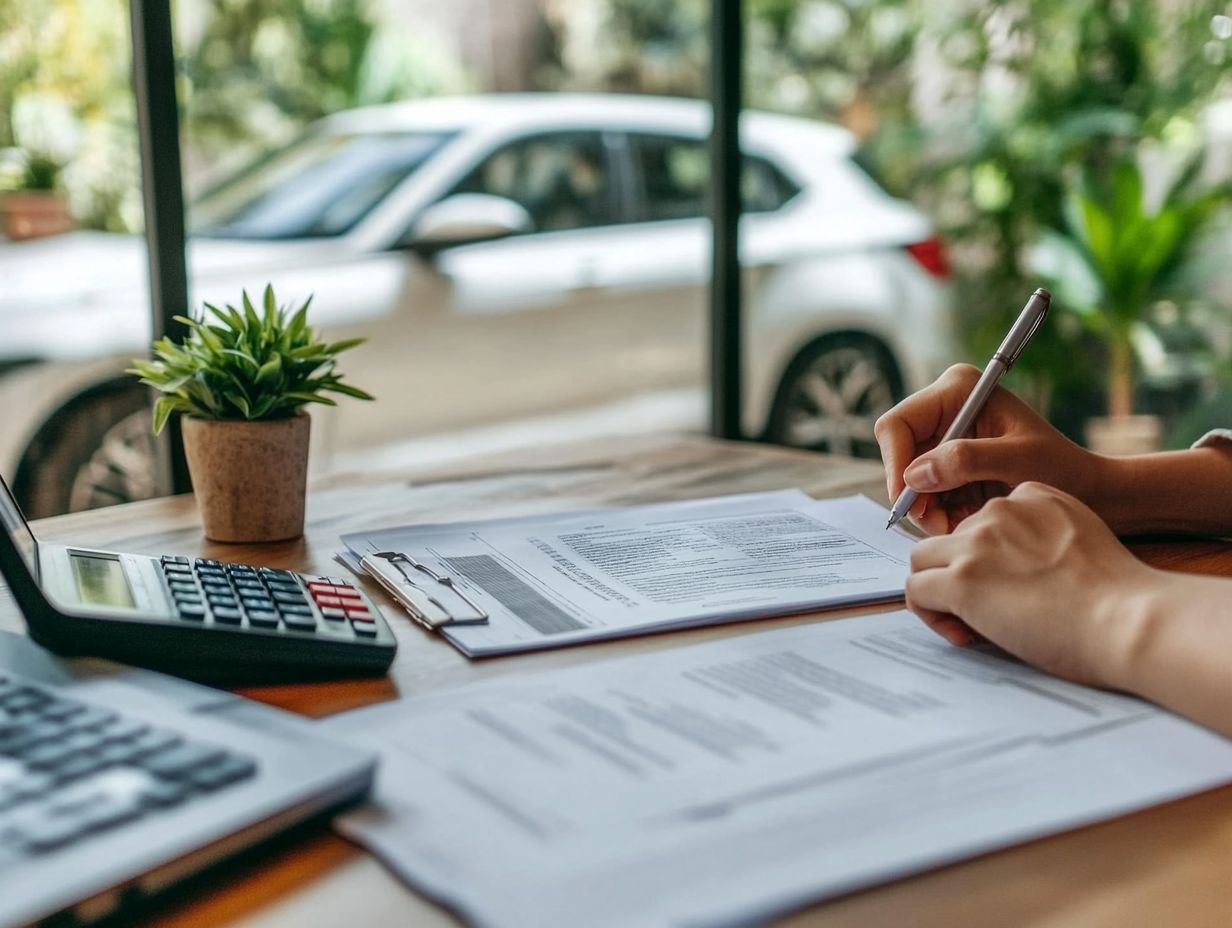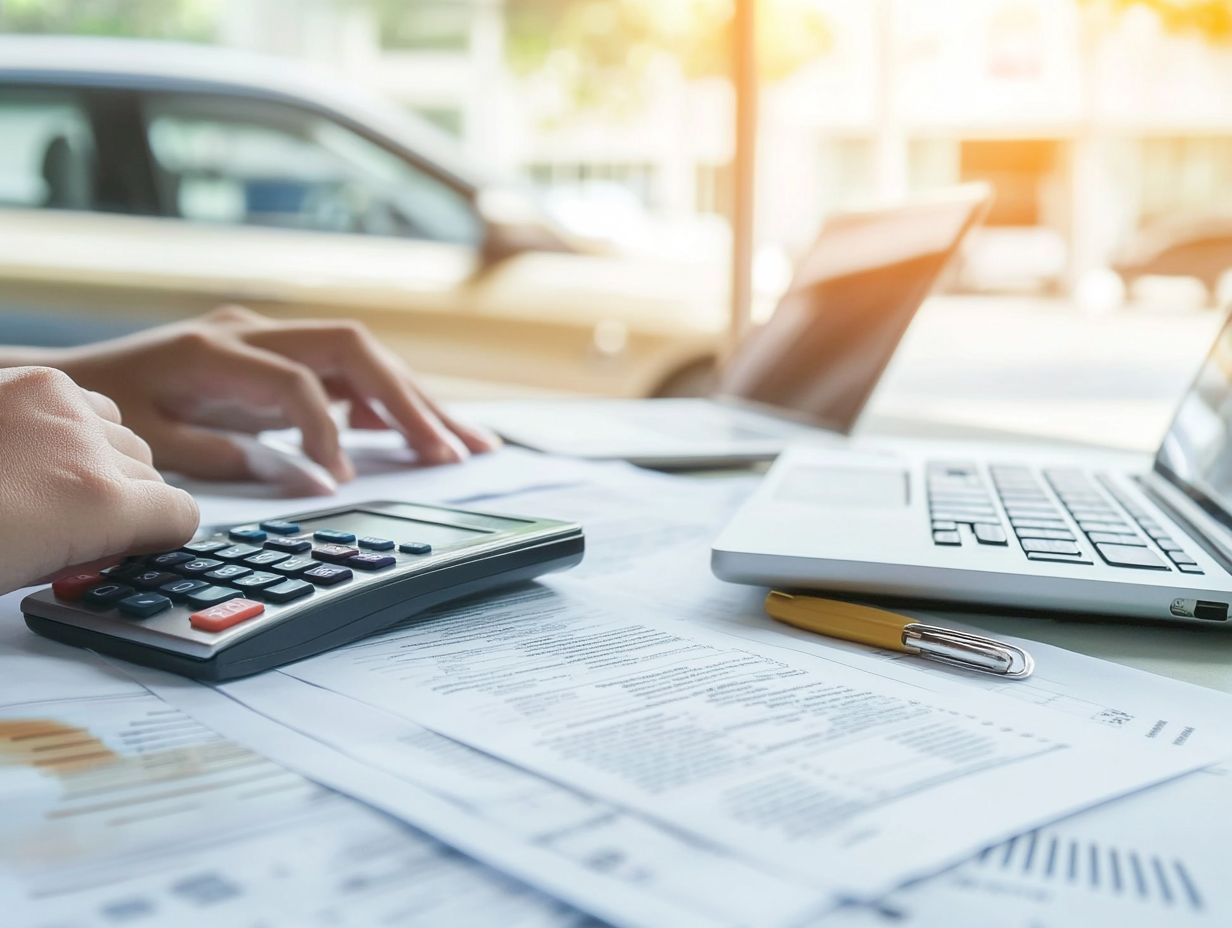Your Guide to Gap Insurance for Leased Cars
When leasing a car, you may feel secure, but unexpected events can create substantial financial gaps. This is precisely where gap insurance steps in.
This guide delves into what gap insurance is, why it s essential, and how it shields you from potential losses. You ll also find details on coverage specifics, costs, and tips on selecting the right policy tailored to your needs.
By the end, you ll gain a clearer perspective on how to protect your investment in a leased vehicle.
Contents
Key Takeaways:

- Gap insurance is a type of coverage that protects leased car owners from owing more money than the car’s value in case of an accident or theft.
- Not having gap insurance for your leased car can lead to money problems, such as having to pay for a car that is no longer drivable or has been stolen.
- When considering gap insurance, compare premiums and deductibles, and choose a policy that best fits your needs and budget. Protect yourself today!
Understanding Gap Insurance for Leased Cars
Understanding GAP insurance for leased cars is very important if you want to protect your financial interests in case of an unexpected total loss. As vehicles lose value over time, a GAP policy can effectively bridge the difference between the payout from your primary insurer and the remaining balance on your lease, providing you with peace of mind and safeguarding you from negative equity.
This optional coverage is tailored to cover the difference between what you owe on your leased vehicle and its current market value, ensuring you aren t caught in a difficult financial situation.
What is Gap Insurance?
GAP insurance, or Guaranteed Asset Protection insurance, is an optional coverage designed to shield you from money problems if your vehicle is deemed a total loss.
This coverage is crucial for anyone leasing a car, as the rapid depreciation the decrease in your car’s value over time can create a difference between the insurance payout and the remaining balance on your lease. For example, if your leased car is stolen or totaled in an accident, standard auto insurance usually covers only its current market value, which may fall significantly short of what you still owe.
Without GAP insurance, you could be left to pay the remaining lease balance yourself, leading to unexpected financial strain.
Insurance premiums can differ greatly, so it s essential to understand any exclusions that might limit your coverage in certain situations. This emphasizes the importance of securing that extra layer of protection when leasing a vehicle.
Why is Gap Insurance Important for Leased Cars?
The significance of GAP insurance for leased cars is very important, offering essential financial protection against the risks tied to total loss situations and insurance payouts that might leave you with a gap in coverage.
In a marketplace where vehicle values can plummet swiftly, it’s crucial for you to shield yourself from potential financial shortfalls arising from unfortunate accidents or theft.
Without GAP insurance, you could find yourself in a vulnerable financial position, confronting substantial expenses that your primary insurer won t cover. Protect your wallet and peace of mind consider GAP insurance now!
The Risks of Not Having Gap Insurance
Not having GAP insurance puts you at significant risk, especially in total loss situations where your insurance payout may fall short of covering the outstanding finance on your leased vehicle.
When an accident happens or if your car gets stolen, the lack of GAP insurance can lead to financial stress that catches many by surprise. Consider this: the average car loses about 20% of its value in the first year alone, and within five years, it can depreciate by roughly 60%.
If you find yourself in a situation of negative equity where what you owe on the car exceeds its market value you could be left responsible for paying off loans while having no vehicle to show for it. With around 25% of vehicles reportedly underinsured, having GAP insurance becomes even more essential for anyone seeking to safeguard against potential financial losses.
How Gap Insurance Works for Leased Cars

Understanding how GAP insurance works for leased cars is crucial. It helps you navigate your insurance policies and ensures your vehicle is covered.
When your leased car is completely damaged due to an accident or theft, your primary insurance will payout based on the current market value. Unfortunately, this amount often falls short of what you owe on the lease.
This is where a GAP policy comes in. It covers the difference between the insurance payout and the balance owed to the finance provider, protecting you from financial pitfalls.
Coverage and Limitations
GAP insurance offers various coverage options for your leased vehicle. However, it s vital to recognize its limitations and exclusions.
This insurance typically covers the gap between what you owe and the car’s actual cash value at the time of loss. However, it usually excludes mechanical failures, normal wear and tear, or damages from illegal activities.
GAP insurance is only applicable if there’s an outstanding balance after your primary auto policy covers most of the loss.
Costs and Savings with Gap Insurance
Understanding the costs and savings linked to GAP insurance is essential. It helps you weigh the expense of insurance premiums against potential financial risks.
Comparing Premiums and Deductibles
When comparing GAP insurance, it’s vital to understand how premiums and deductibles work together. This knowledge helps you make an informed choice regarding your leased vehicle’s financial protection.
Your GAP insurance premiums significantly affect your policy’s overall cost. Meanwhile, deductibles determine your out-of-pocket responsibility in a loss situation.
Several factors influence these rates, including your car’s make and model, your driving history, and the pricing structures of different insurance providers. For instance, companies like Geico and Progressive might offer more competitive premiums than Allstate.
By exploring multiple providers, you can evaluate the costs and the financial security different deductibles can provide when needed most.
Choosing the Right Gap Insurance Policy
Choosing the right GAP insurance policy requires careful consideration of several factors. Evaluate the available coverage options and assess your insurance provider’s reputation.
Reflecting on your specific financial protection needs ensures you secure the best policy for your circumstances.
Factors to Consider

When evaluating GAP insurance, consider the type of vehicle you’re leasing. Whether it s a sedan, SUV, or luxury model can affect your insurance premiums.
Understanding your lease terms is equally crucial. Longer leases may require different coverage compared to shorter ones.
Think about potential financial risks, such as depreciation rates and your ability to cover out-of-pocket expenses if a total loss occurs. Comprehending coverage options and exclusions will protect you from unexpected costs.
This ensures your policy aligns with your needs, effectively safeguarding your financial investment.
Filing a Gap Insurance Claim
Filing a GAP insurance claim is an essential process that demands your careful attention to detail. By doing so, you can ensure a smooth experience and secure the financial protection you need after the total loss of your leased vehicle.
Step-by-Step Process
The step-by-step process of filing a GAP insurance claim involves clear steps that ensure your claim is properly documented and submitted to your insurance provider without delay.
- Start by gathering all relevant documentation, including your policy details, accident reports, and any outstanding loan statements related to your vehicle.
- Once you have these documents organized, it’s crucial to fill out the claim form with precision; even a minor mistake can lead to frustrating delays or outright denial.
After submitting your claim, maintain regular communication with the insurance provider to confirm they have everything needed for processing.
Timeliness is key throughout this process, as any delays could worsen financial strains during an already challenging time.
Stay proactive! Following up consistently keeps you in the loop and ready for anything, ultimately paving the way for a smoother resolution.
Frequently Asked Questions
What is gap insurance for leased cars?
Gap insurance for leased cars is a type of insurance that covers the difference between the amount you owe on your leased car and the actual cash value of the car in the event of a total loss. This protects you from unexpected financial costs in case of accidents or theft.
Do I need gap insurance for my leased car?

While gap insurance is not legally required, it is highly recommended for those who are leasing a car. Leased cars often depreciate faster than the payments made towards them, leaving you at risk of owing more than the car is worth in case of an accident. Gap insurance gives you peace of mind and keeps you financially safe.
How does gap insurance for leased cars work?
If your leased car is declared a total loss due to an accident or theft, your insurance company will determine its actual cash value. If this amount is less than the amount you owe on the car, gap insurance will cover the difference. This can include any remaining lease payments, fees, and other related costs.
Can I purchase gap insurance for my leased car from any insurance company?
Yes, you can purchase gap insurance for your leased car from any insurance company that offers it. However, it is recommended to purchase it from the same company that provides your car insurance. This can help streamline the claims process and ensure that there are no gaps in coverage.
Can I cancel my gap insurance for leased cars?
Yes, you can cancel your gap insurance for leased cars at any time. However, it is important to check with your insurance company for their specific cancellation policies. Keep in mind that cancelling gap insurance may leave you at risk of having to pay out of pocket for any gaps in coverage in case of a total loss.
Is gap insurance for leased cars expensive?
The cost of gap insurance for leased cars varies depending on factors such as the make and model of the car, your driving history, and the insurance company. However, it is typically affordable and can provide valuable financial protection in the long run.
Ready to secure your financial safety? Contact your insurance provider today!






